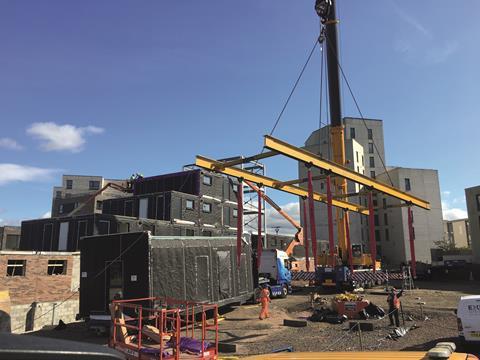I can almost set my watch by it. Every 10 years, it seems, I convince myself that this time, modular housing is finally set to take off. My latest enthusiasm for modern methods of construction (MMC) looks more short-lived than usual.

In 2021 I asked: has MMC’s moment finally come? I trotted out the benefits of modular construction, in which near-fully-fitted houses can be manufactured and transported to site as two or three modules, then bolted together in a day or two: greater quality and cost control; minimal wastage; and greater return on capital employed (ROCE) because of faster build times.
Progress, admittedly, had been stymied for decades by, at best, intermittent acceptance of MMC among housebuilders – not least because some had engaged in their own ill-timed manufacturing ventures.
But this time, Covid-19 and Brexit, then the Ukraine invasion, have fuelled skill and supply shortages; and sustainability is sharpening the focus on waste, minimised in a controlled factory environment.
North Yorkshire-based ilke Homes, however, decided last week that it would “pause operations” while it sought funding, including a possible sale “to meet overheads, achieve further scale and become cashflow positive”. I understand big housebuilders had been approached in previous weeks to invest several tens of millions of pounds in ilke. The private-equity-backed company, formed in 2016, had made two additional fundraisings of £60m and £100m, including from government quango Homes England in November 2021, then as recently as December 2022.
‘Pump-priming’ fail
Ilke’s problems appear to have been compounded by its strategy of combining sales of its predominantly affordable housing units with its own turnkey offering, where it acquires land, secures planning permission and develops sites. This was a ‘pump-priming’ approach to quadruple factory output to 4,000 homes a year, while recycling development profits. But last week’s statement concluded: “This has been complicated by uncertainty over planning and rising build costs.” Meanwhile, direct sales had been hit by plunging housing starts.
In May, L&G looked to have called time on its problem-blighted factory near Leeds, which the insurance giant had planned to feed a burgeoning build-to-rent, social and private housing empire. Over six years, L&G Modular Homes had amassed losses of £174m but admitted: “Without the necessary scale of pipeline, it’s not sustainable to continue producing modules.”

Other modular groups to falter recently include Urban Splash’s House joint venture with the world’s largest modular group, Japan’s Sekisui House, and Caledonian Modular, subsequently bought out of administration.
I wasn’t a lone cheerleader. The Farmer Review’s unfortunately titled 2016 report ‘Modernise or die’ probed MMC’s theoretical opportunities. It said L&G’s factory “represents one of the biggest potential disruptions in the UK residential sector with a manufacture-led approach being used at an unprecedented scale”.
So where did so much go wrong in practice? Builders aren’t entirely in the dark ages: Barratt and Bellway are testing low-energy homes in a giant meteorological chamber at the University of Salford. But the project heads expressed doubts about full modular, preferring 2D techniques, in which panels can be quickly assembled on site almost as fast as modular. ‘Volumetric’ lacks flexibility on site, they argued. Delivery is also a challenge: you can load a lorry much more efficiently with ‘flat-packed’ panels; “with modular you’re mainly transporting fresh air down the motorway” was one developer’s retort.
Possibly one of housebuilding’s hardest-nosed chief executives, Greg Fitzgerald, sees a future for MMC, albeit in a 2D rather than 3D vision. In one of its last acts as an independent company, Countryside Partnerships last July shut one of its three factories and sought a buyer for the remaining modular business.
Two months later, Vistry Group bought the whole of Countryside. Rebranded Vistry Works, the two existing plants are expected to deliver and a rejigged third is to be reopened later this year – all producing a slightly less bells-and-whistles version of Countryside’s panels.
For now, perhaps, the world of MMC remains flat.
Alastair Stewart is an equities analyst and consultant
RESi360 is a crucial event for the UK resi sector, providing leading organisations with the insights and networking essential to driving sustainable growth. More than 2/3 of participants are at director-level and above!

































No comments yet